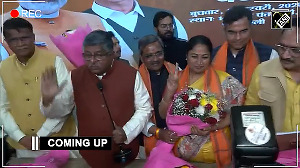One can only hope the euphoria and sycophancy attendant with such electoral triumph does not blind the Singh government into believing its own electoral sales pitch. There is a lot to be said about the poor performance of the UPA government indeed, hamstrung as it was, by the necessary consequences of cobbling together with ideologically disjointed partners.
Partners with disjointed ideology gave way to partners with no ideology last August. However, not much was achieved since the sole ideology of staying in power does not give strategic directional thrust. Even the Congress Party did not expect such a result an individual score of over 200 seats in Parliament, with only two other pre-poll alliance partners reaching double-digits and that too with less than 20 seats each.
The task before the new government is enormous. Governance indeed is in disarray. There is little or no feeling of responsibility and ownership towards institutions of governance. However, such apathy is not uniform. Government has indeed shown interest in state institutions provided a political agenda has provided the motivation.
Take for instance, the case of Securities Appellate Tribunal, by far India's best quasi-judicial tribunal. Two of the three members have retired and for nearly six months, the tribunal is dysfunctional without the necessary judges to dispose of appeals.
A selection committee comprising the current finance secretary, the current Governor, Reserve Bank of India and the presiding judge of the Securities Appellate Tribunal had made selections to fill the vacancies in the Securities Appellate Tribunal in November last year. The government has not managed to get them appointed till date.
Labour tribunals in Mumbai too are without judges. The Bombay High Court issued a writ to the government to appoint members of the labour tribunal and yet the vacancies remained unfilled.
Responding to a public interest litigation by this author seeking a direction to the government to fill vacancies, the government made a statement that the appointments committee of the Union Cabinet is seized of the matter, leading the court to express hope that the vacancies would be filled without further delay.
However, while this committee has been paralyzed over the appointments for over six months, in the past six weeks, the same committee worked overtime to replace the Chairman of the company that runs India's state-owned aviation operations twice.
An active Aviation Minister belonging to a political party that needed to be placated during elections seems to have made the difference. In contrast, an officiating Finance Minister was the one who had sulked about reporting to his one-time junior when this government was formed in 2004.
Government policy regulating foreign investment into India has been a mess for most part of the UPA government. Drafting has been consistently imprecise and press releases of the government took positions not supported by Parliamentary statute.
Old and outmoded press releases written when repealed exchange control statutes were in force, were not only revived but also mis-interpreted. Recently Press Notes 2, 3 and 4 of 2009 were issued to clarify a few long-pending issues plaguing foreign investment. Media reports already speak of the government planning to withdraw or modify the new policy contained in these press notes.
Tax authorities, pushed by a government to meet targets repeatedly attempted to violate tax avoidance treaties with other nations. Not only are capital gains earned by companies registered in nations having tax The new Companies Bill was tabled in Parliament weeks before the Lok Sabha was scheduled to be dissolved, which would mean the bill would lapse.
The draft bill entails some inexplicable policy gyrations without any credible explanation. For instance, it seeks to do away with differential voting rights altogether a measure that was introduced not too long ago.
It also fails to deliver the much-awaited clarity on the law governing squeezing out minority shareholders meanwhile, minority shareholders continue to get squeezed out by way of selective reduction of capital a measure approved in a recent opinion of a division bench of the Bombay High Court (Without Contempt edition dated May 4, 2009).
The government has been smug about the Indian economy attracting investments regardless of the state of law and policy here. Post-poll, the temptation to be smug in claiming voters endorsement will be high.
However, such attitude would be unbecoming. Razeen Sally of the London School of Economics wrote a critique of the past five years performance in the Far Eastern Economic Review.
The patriotic pride of many an Indian was hurt. Perhaps embarrassed by the poll results, Wall Street Journal seems to have quietly taken the piece off its website and it can only be read on: https://www.ecipe.org/dont-believe-the-india-hype/File. The piece underlines how decadent our institutions are becoming. Brushing it off as a foreigner's anti-India bias will only leave us imagining India to be a perfect place.
(The author is a partner of JSA, Advocates & Solicitors. The views expressed herein are his own.)







 © 2025
© 2025